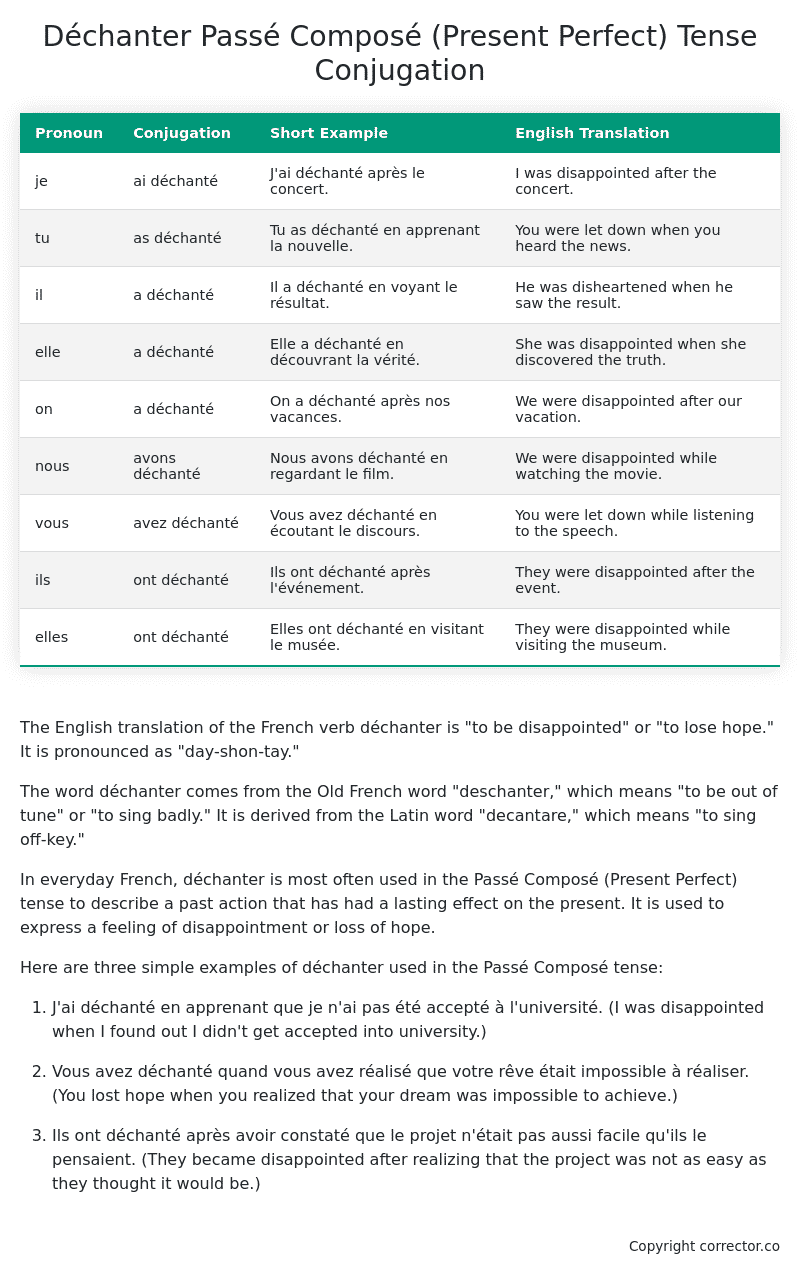Passé Composé (Present Perfect) Tense Conjugation of the French Verb déchanter
Introduction to the verb déchanter
The English translation of the French verb déchanter is “to be disappointed” or “to lose hope.” It is pronounced as “day-shon-tay.”
The word déchanter comes from the Old French word “deschanter,” which means “to be out of tune” or “to sing badly.” It is derived from the Latin word “decantare,” which means “to sing off-key.”
In everyday French, déchanter is most often used in the Passé Composé (Present Perfect) tense to describe a past action that has had a lasting effect on the present. It is used to express a feeling of disappointment or loss of hope.
Here are three simple examples of déchanter used in the Passé Composé tense:
-
J’ai déchanté en apprenant que je n’ai pas été accepté à l’université. (I was disappointed when I found out I didn’t get accepted into university.)
-
Vous avez déchanté quand vous avez réalisé que votre rêve était impossible à réaliser. (You lost hope when you realized that your dream was impossible to achieve.)
-
Ils ont déchanté après avoir constaté que le projet n’était pas aussi facile qu’ils le pensaient. (They became disappointed after realizing that the project was not as easy as they thought it would be.)
Table of the Passé Composé (Present Perfect) Tense Conjugation of déchanter
| Pronoun | Conjugation | Short Example | English Translation |
|---|---|---|---|
| je | ai déchanté | J’ai déchanté après le concert. | I was disappointed after the concert. |
| tu | as déchanté | Tu as déchanté en apprenant la nouvelle. | You were let down when you heard the news. |
| il | a déchanté | Il a déchanté en voyant le résultat. | He was disheartened when he saw the result. |
| elle | a déchanté | Elle a déchanté en découvrant la vérité. | She was disappointed when she discovered the truth. |
| on | a déchanté | On a déchanté après nos vacances. | We were disappointed after our vacation. |
| nous | avons déchanté | Nous avons déchanté en regardant le film. | We were disappointed while watching the movie. |
| vous | avez déchanté | Vous avez déchanté en écoutant le discours. | You were let down while listening to the speech. |
| ils | ont déchanté | Ils ont déchanté après l’événement. | They were disappointed after the event. |
| elles | ont déchanté | Elles ont déchanté en visitant le musée. | They were disappointed while visiting the museum. |
Other Conjugations for Déchanter.
Le Present (Present Tense) Conjugation of the French Verb déchanter
Imparfait (Imperfect) Tense Conjugation of the French Verb déchanter
Passé Simple (Simple Past) Tense Conjugation of the French Verb déchanter
Passé Composé (Present Perfect) Tense Conjugation of the French Verb déchanter (this article)
Futur Simple (Simple Future) Tense Conjugation of the French Verb déchanter
Futur Proche (Near Future) Tense Conjugation of the French Verb déchanter
Plus-que-parfait (Pluperfect) Tense Conjugation of the French Verb déchanter
Passé Antérieur (Past Anterior) Tense Conjugation of the French Verb déchanter
Futur Antérieur (Future Anterior) Tense Conjugation of the French Verb déchanter
Subjonctif Présent (Subjunctive Present) Tense Conjugation of the French Verb déchanter
Subjonctif Passé (Subjunctive Past) Tense Conjugation of the French Verb déchanter
Subjonctif Imparfait (Subjunctive Imperfect) Tense Conjugation of the French Verb déchanter
Subjonctif Plus-que-parfait (Subjunctive Pluperfect) Tense Conjugation of the French Verb déchanter
Conditionnel Présent (Conditional Present) Tense Conjugation of the French Verb déchanter
Conditionnel Passé (Conditional Past) Tense Conjugation of the French Verb déchanter
L’impératif Présent (Imperative Present) Tense Conjugation of the French Verb déchanter
L’infinitif Présent (Infinitive Present) Tense Conjugation of the French Verb déchanter
Struggling with French verbs or the language in general? Why not use our free French Grammar Checker – no registration required!
Get a FREE Download Study Sheet of this Conjugation 🔥
Simply right click the image below, click “save image” and get your free reference for the déchanter present perfect tense conjugation!

Déchanter – About the French Passé Composé (Present Perfect) Tense
Formation of the Passé Composé
Set the auxiliary verb with either
Conjugate the auxiliary verb
Add the past participle
Common everyday usage patterns
Narrating Past Events
Sequential Actions
Describing Completed Actions
Interactions with other tenses
Imperfect Tense
Conditional and Future Tenses
Summary
I hope you enjoyed this article on the verb déchanter. Still in a learning mood? Check out another TOTALLY random French verb conjugation!


